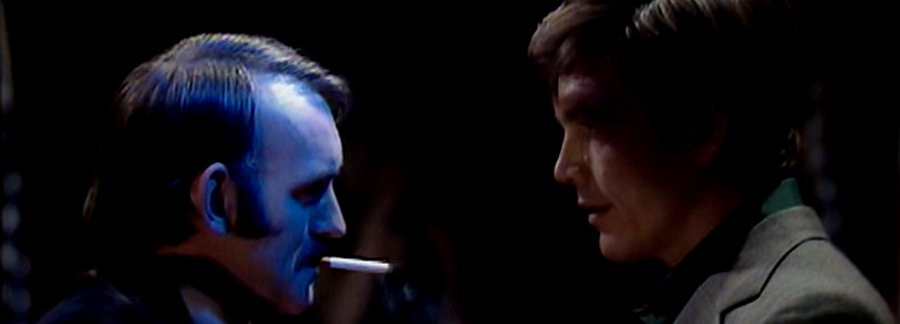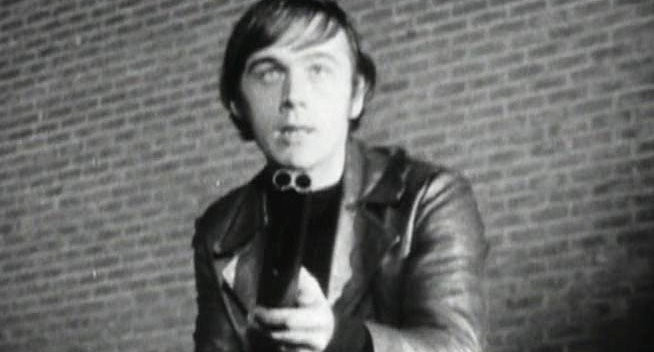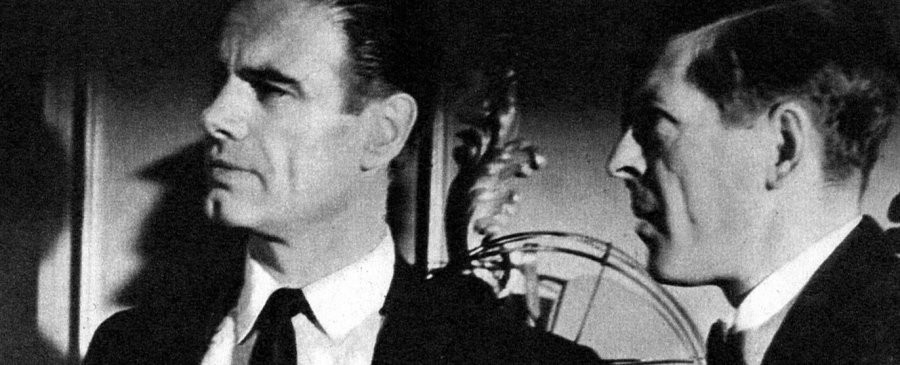
Money Heist (La Casa de Papel)
2017 - SpainThe story grabs the viewer almost immediately and never lets go
La Casa de Papel/Money Heist reviewed by John Winterson Richards
Intended as something of a prestige project, the crime drama La Casa de Papel was initially well received but proved not to have legs when it was first shown on the Spanish channel Antena 3. There the story would usually end except that, like many such shows, it was sold cheaply to Netflix to be part of their huge pile of spare "content" for casual binge watching - and there it proved a ginormous global hit.
Indeed, it soon took the record for the most viewed Netflix show not made in English - eventually smashed by the Korean Squid Game - and this, like 'Squid Game,' in spite of it having no real dedicated marketing of its own. Sometimes these things just happen. Anyone who could predict them would become very wealthy. Something happens to catch the public mood and word of mouth, or, these days, internet, does the rest.
Those with a taste for sociology like to prose about both shows coinciding with a global disillusionment with capitalism in the wake of the 2008 crash, but the timing is wrong, a bit late for 2008 and too early for the subsequent coronavirus crash. The truth is more likely that international audiences are now quite sophisticated and recognise a good production when they see one, regardless of its origins.
For 'La Casa de Papel' is a brilliant production all round. Netflix did not have to apply any particular magic to what had been shown on Antena 3 apart from recutting to increase the number of episodes and shorten them: the longer episodes were more immersive on television, but the shorter ones are more likely to encourage binge watching on streaming. This is why some episodes seem to have endings in the middle, which can be a little jarring, when viewed in Netflix.

The only other change was to the title from 'La Casa de Papel' to the odd sounding 'Money Heist.' It is hard to understand this decision. Was it intended to suggest deliberately that the translator was not entirely familiar with English language idiom in order to make it seem more foreign and exotic? If so, it would surely have been far more exotic to stick with the rather poetic 'La Casa de Papel,' or at least the literal English translation, "The House of Paper." It would also be more appropriate, because the first heist, the one originally shown on Antena 3, was set in the Royal Mint of Spain, where a gang of criminals break in to print their own currency - so that, if one is being strictly accurate, no actual money is actually stolen: there is therefore no money heist in 'Money Heist.'
The title 'La Casa de Papel' is also more appropriate on the allegorical level. One of the big themes is the difference between a plan on paper and reality. Another is the fragility of the dreams and aspirations of the characters, like houses made out of paper.
Either way, both the Spanish and English titles remained unchanged when Netflix commissioned a continuation of their own in which the target was not money at all but the national gold reserves in the Bank of Spain. This second heist was spread over three seasons, known a bit confusingly as "parts," totalling 28 episodes made according to the more standard Netflix format of shorter episodes.

It mimics the style of the cheerful "caper" movies of the 1950s and 60s in which a diverse gang of misfits, some with specialist skills, are brought together by a criminal mastermind to pull off an incredibly complicated robbery. Think of 'The League of Gentlemen,' 'Ocean's 11,' 'Topkapi,' and 'The Italian Job.' However, the tone is very different, far more "adult" in terms of sex and violence. People die, including characters with whom we have come to sympathise.
That said, death is no obstacle to keeping a popular character, especially in the form of "flashbacks" as the story loves to play with the timeline. The claustrophobia of the heists themselves is often relieved by cuts to other times and places. The format of television enables us to explore the various characters, their backgrounds, and their relationships in a way that cannot be done in traditional feature films. So people who seem at first little more than the stock characters who usually inhabit such projects are gradually revealed to have far greater depth.

The clever bit is how this is done without any loss of pace. The story grabs the viewer almost immediately and never lets go. Just as one problem seems to be solved, another comes out of nowhere. Much of the suspense comes from us not knowing whether a given situation is a genuine surprise to our criminal mastermind, "the Professor," or whether he has prepared one of his meticulous contingency plans for just such an occasion. It is a joy to see these plans unfold, especially when all seems lost, but it comes as a real shock to the Professor, and the viewer, when something happens that he has not foreseen - the moral of the story being that we cannot plan for everything in this life. Yet the irony is that it is when he is forced, very reluctantly, to improvise at short notice that the Professor is at his best. There is perhaps a moral there too.
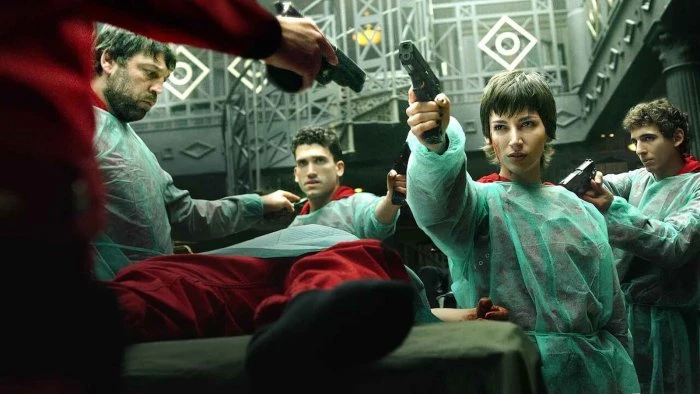
As usual with such "caper" heists, the plot is not to be taken too seriously. It is full of holes, inconsistencies, inaccuracies, and total absurdities. We are expected to believe that, after a little paramedic training, poorly educated criminals can perform major surgery on gunshot wounds so that the patients are running around soon after. The chief negotiator in a hostage situation takes time out to go on a date - actually, this is Spain, so perhaps that one is possible, and the criminals themselves seem to be doing the same, conducting romances while under siege. There are points when the whole gang is gathered together having meaningful conversations with no one watching their hostages or the Police outside. Indeed, that eventually proves to be their downfall, but not before both sides have come across as thoroughly incompetent in spite of the clever high-level strategizing of their respective leaders.
The greatest tribute to 'Money Heist' is that it keeps our attention in spite of our awareness of all these absurdities and more. We still want to know what happens next. The key to this is the characterisation. It is hardly realistic but we come to care about these people, even if most, on both sides, are pretty reprehensible when viewed objectively.
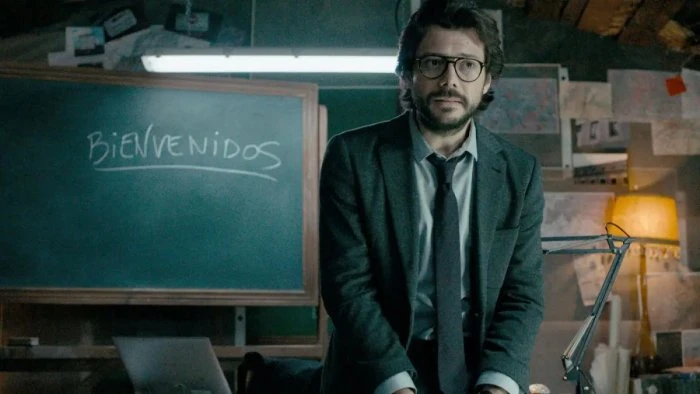
As his name suggests, the Professor was originally intended to be an older man, but the casting of Alvaro Morte (The Wheels of Time) in the role changed the whole dynamic of the character and the show. With the manner and dress sense of a junior academic, he is the epitome of "geek chic." Beneath the spectacles, the nervousness, the intensity, and the obsession over details is a handsome man who is calm and resolute once he has decided on a plan. He is firm when insisting that his unruly gang follows strict rules. The first rule is that they should know as little about each other as possible. Romantic relationships are especially prohibited. Needless to say that particular rule is not obeyed - and the Professor himself ends up being the worst offender.
In the tradition of 'Reservoir Dogs,' the gang are even forbidden to use their real names, but instead of being arbitrarily assigned colours each is allowed to choose the name of a city. Thus "Nairobi" (Alba Flores) is a flamboyant forger. "Tokyo" (Ursula Corbero), the narrator, is a classic Bad Girl in the tradition of 'Film Noir' via the French "New Wave" and Tarantino.
The most interesting relationship, however, is not romantic: it turns out that the Professor and his second-in-command and assault team captain, Berlin, already know each other very well. An experienced thief and compulsive narcissist, Berlin is played by Pedro Alonso as a sort of Spanish Jeremy Irons. He represents chaos in contradiction to the Professor's belief in order and planning. Alternately fascinating, revolting, urbane, deluded, heroic, and pitiable, this is a character who deserves his own "spin off" - which, at the time of writing, he seems to be getting.

On the other side, the Police with whom the Professor plays mental chess are represented by successive Inspectors who are both single mothers but otherwise have little in common: where Itziar Ituno gives us a relatively realistic portrait of a working woman in a man's world - note the "relatively" - singer Najwa Nimri chews the scenery to great effect. They are helped and hindered by Juan Fernandez and Fernando Cayo as sinister Colonels in Spanish Intelligence who give the impression that Franco is far from dead in modern Spain. Enrique Arce is fun as the sleazy Director of the Royal Mint, who is nevertheless allowed a couple of moments of brittle courage in the first heist, but the character is rather thrown away after being inserted somewhat artificially into the second.
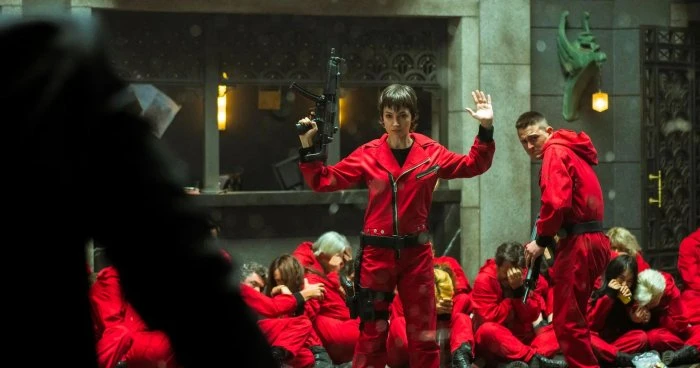
The second heist is opened out more. Netflix investing directly increased the budgets substantially, and this is visible in glamorous location work in Florence, Thailand, Panama, and Denmark. However, the storytelling becomes less sure: the absurdities increase and shocks are no substitute for human drama. It gets a bit more political - which in television always means a certain type of politics - but this only serves to draw attention to the truth that our "heroes" are not good people: they endanger, and even kill, others out of selfish greed and a desire for excitement without any higher motive.
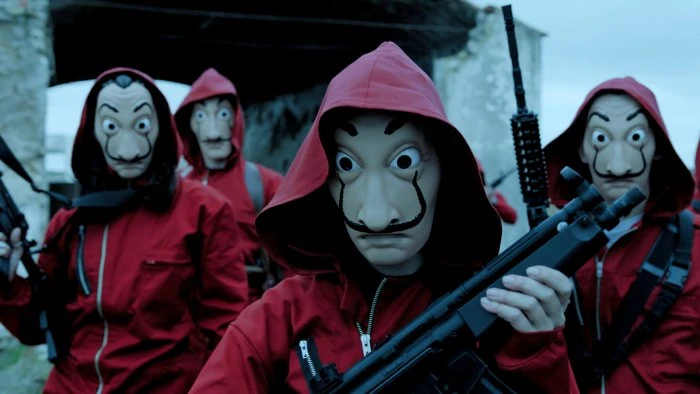
The show's Dali masks, obviously based on the Guy Fawkes masks from 'V for Vendetta,' have nevertheless become real world symbols of protest. In a regrettable example of life copying art, there have also been cases of actual robbers disguising themselves in costumes from the show. If it is a tribute of sorts it cannot be denied that it is well deserved: the magnificent production design as a whole tends to stick in the mind - and seems to have influenced 'Squid Game' - as does the eclectic soundtrack. Be warned that it may be difficult to get the Italian protest anthem 'Bella Ciao' out of your head for a while after watching. It is still worth it.
Seen this show? How do you rate it?
Seen this show? How do you rate it?
Published on October 4th, 2022. Written by John Winterson Richards for Television Heaven.


